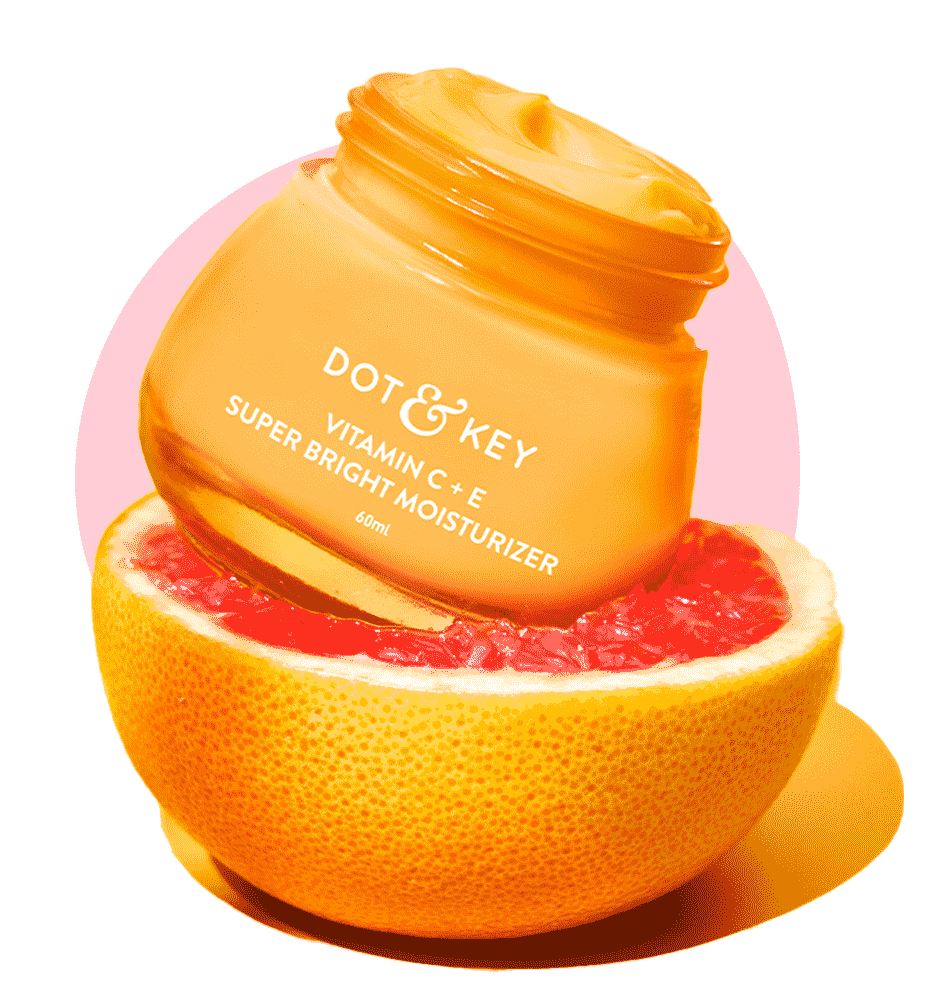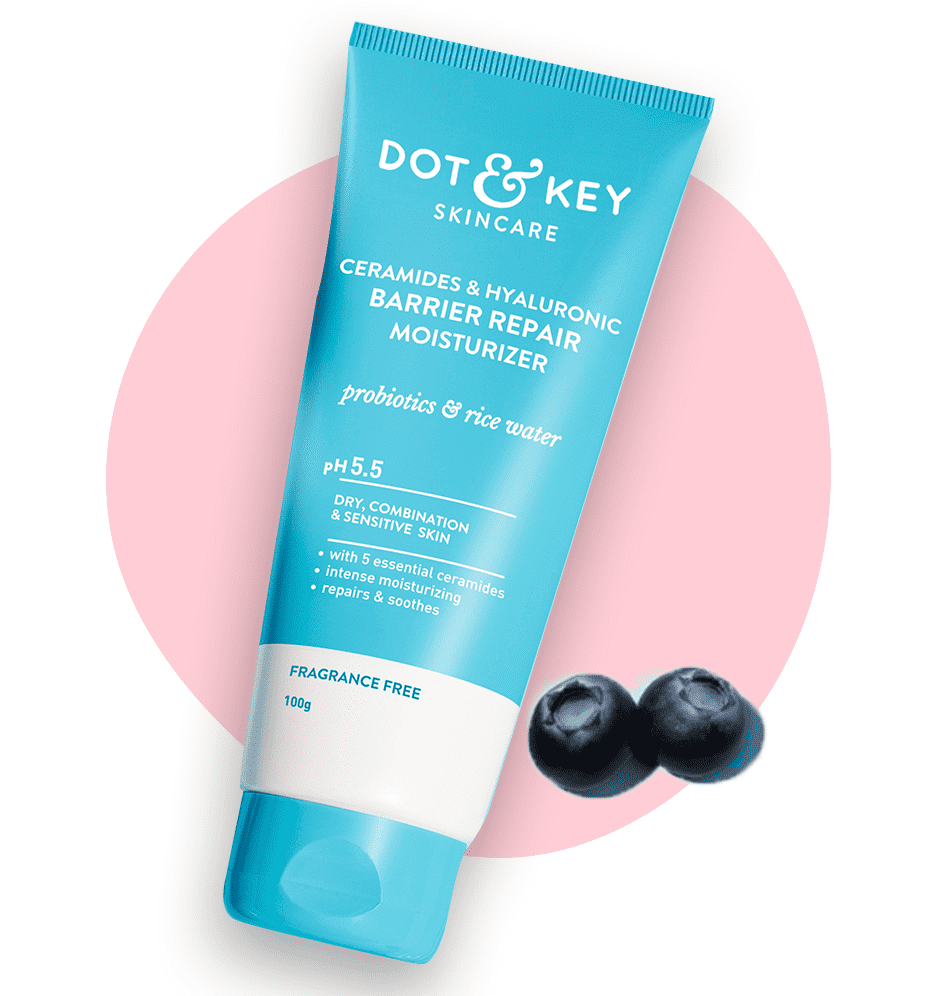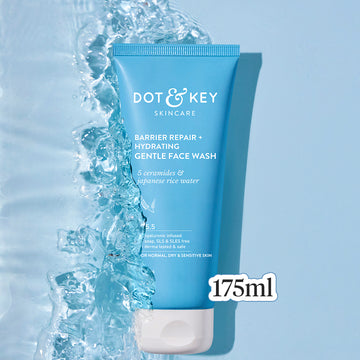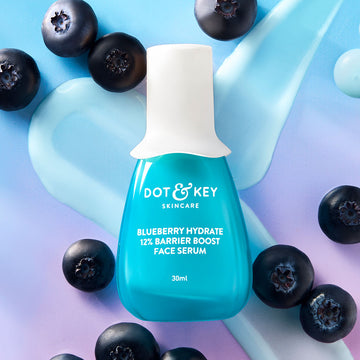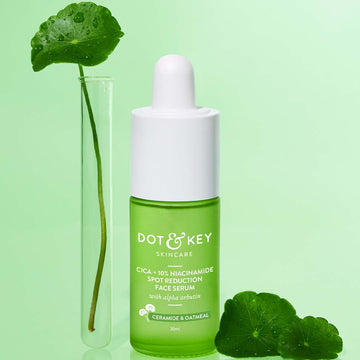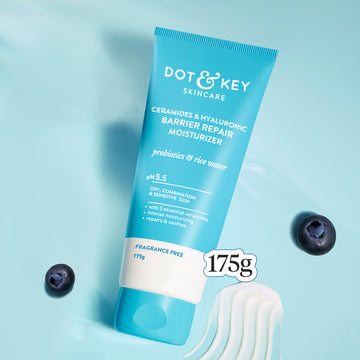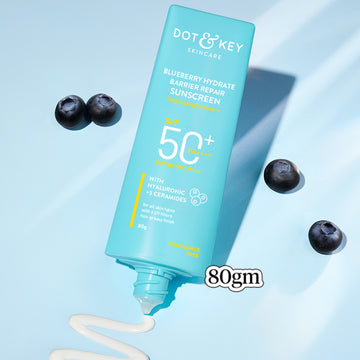
If summer feels like a battle against redness, irritation, and unexpected breakouts, you’re not alone! Sensitive skin tends to react to heat, humidity, and sun exposure, making the season extra challenging. But don’t worry—keeping your skin happy doesn’t have to be complicated! With the right routine, you can soothe, protect, and maintain that natural summer glow without flare-ups. In this blog, we’ll dive into what makes sensitive skin act up and share a step-by-step summer skincare routine to keep your skin calm, cool, and radiant all season long!
What Causes Sensitive Skin?
Ever feel like your skin has a mind of its own—flaring up at the slightest change in weather or reacting to products that seem fine for everyone else? That’s because sensitive skin is more reactive to external factors like climate shifts, skincare ingredients, and even pollution. If your skin often feels tight, itchy, or irritated, you’re not alone! Let’s break down the key reasons why sensitive skin acts up, especially in the summer.
Key Causes of Sensitive Skin:
- Weak Skin Barrier: The skin barrier is responsible for protecting your skin from environmental aggressors and retaining moisture. In sensitive skin, the barrier is often compromised, allowing irritants to penetrate the skin more easily. Studies published in The Journal of Clinical and Aesthetic Dermatology highlight that a weakened barrier leads to more frequent skin reactions and heightened sensitivity.
- Environmental Factors: Weather changes, especially during summer, can exacerbate sensitive skin. Hot, humid conditions, along with UV exposure, can lead to inflammation, redness, and irritation. Moreover, air conditioning can dehydrate the skin, making it more prone to irritation.
- Skincare Ingredients: Some skin care products contain harsh ingredients like alcohol, fragrances, and sulfates, which can trigger sensitivity. According to research, sensitive skin reacts poorly to these ingredients because they strip away natural oils, leaving the skin vulnerable to irritation.
- Genetics: Genetics play a significant role in determining your skin’s sensitivity. People with a family history of skin conditions like eczema, rosacea, or psoriasis are more likely to have sensitive skin. Research published in The Journal of Investigative Dermatology highlights that genetic factors contribute to a weaker skin barrier and increased sensitivity to external irritants.
- Sun Exposure: UV rays can damage sensitive skin more easily, leading to sunburn, irritation, and long-term skin damage. People with sensitive skin must be particularly vigilant about sun protection during summer, as UV exposure can worsen their skin’s condition.
Step-by-Step Summer Skin Care Routine for Sensitive Skin
Here’s a comprehensive summer skincare routine that will help you keep your sensitive skin calm, hydrated, and protected during the warmer months.
Step 1: Cleanser (AM & PM)
Cleansing is the foundation of any skincare routine, but it’s important to use a gentle, sulfate-free cleanser for sensitive skin. During summer, your skin is exposed to sweat, pollution, and sunscreen buildup, so cleansing is essential to remove these impurities without stripping your skin of its natural moisture. Look for cleansers with hydrating and soothing ingredients like glycerin & hyaluronic.
How to Do It:
- In the morning, use a gentle cleanser to remove sweat and impurities from your skin without causing irritation.
- At night, cleanse again to remove makeup, sunscreen, and pollutants accumulated throughout the day. Use lukewarm water, as hot water can further irritate sensitive skin.
Pro Tip: Avoid cleansers with harsh ingredients like alcohol or sulfates, as they can trigger flare-ups and irritation.
Step 2: Exfoliation (PM: 1-2 times a week)
Exfoliating helps remove dead skin cells and prevents clogged pores, but for sensitive skin, it’s important to be gentle. Over-exfoliation can weaken the skin barrier and lead to irritation. Use a mild exfoliant like lactic acid or an enzyme-based exfoliant 1-2 times a week to keep your skin smooth without causing irritation.
How to Do It:
- At night, after cleansing, apply a gentle exfoliant once or twice a week. Avoid harsh scrubs that can damage sensitive skin.
- Focus on areas prone to buildup, like the T-zone, but be careful not to over-exfoliate.
Pro Tip: Stick to chemical exfoliants, like AHAs, that dissolve dead skin cells without the need for scrubbing.
Step 3: Toner (AM & PM)
Toners help restore the skin’s pH balance and provide an extra layer of hydration. For sensitive skin, choose an alcohol-free toner with soothing ingredients like rice water. These ingredients help calm irritation, reduce redness, and hydrate the skin.
How to Do It:
- In the morning, apply toner to refresh and hydrate your skin after cleansing.
- At night, use the toner again to balance your skin and prepare it for the following steps in your routine.
Pro Tip: Avoid toners with alcohol or strong fragrances, as they can dry out and irritate sensitive skin.
Step 4: Serum (AM & PM)
Serums provide targeted treatment for specific skin concerns. For sensitive skin, choose a hydrating serum with ingredients like hyaluronic acid or niacinamide. These ingredients help restore moisture and strengthen the skin barrier without causing irritation. Niacinamide, in particular, is known for its anti-inflammatory properties, which can reduce redness and calm sensitive skin.
How to Do It:
- In the morning, apply a lightweight, hydrating serum to lock in moisture and keep your skin calm throughout the day.
- At night, use a soothing serum with niacinamide to help repair the skin’s barrier and reduce irritation overnight.
Pro Tip: Choose fragrance-free serums to avoid triggering sensitivity.
Step 5: Moisturizer (AM & PM)
Moisturizing is essential for maintaining the skin’s hydration levels and protecting the skin barrier. For sensitive skin, use a rich but lightweight, fragrance-free moisturizer that hydrates without clogging pores. Look for ingredients like ceramides, hyaluronic, and shea butter, which help strengthen the skin barrier and retain moisture.
How to Do It:
- In the morning, apply a lightweight, hydrating moisturizer to lock in moisture and protect your skin throughout the day.
- At night, use a richer, more nourishing moisturizer to repair and hydrate your skin while you sleep.
Pro Tip: Consider using a gel-based moisturizer during the summer to keep your skin hydrated without feeling heavy or greasy.
Step 6: Sunscreen (AM)
Sunscreen is important for sensitive skin, especially during summer when UV exposure is higher. Look for a mineral-based sunscreen with ceramide or hyaluronic & zinc oxide or titanium dioxide, as these ingredients provide broad-spectrum protection without irritating the skin. Avoid chemical sunscreens, which can trigger sensitivity and cause redness.
How to Do It:
- After moisturizing in the morning, apply sunscreen with at least SPF 30 to protect your skin from UV rays. Reapply every two hours if you’re spending time outdoors.
Pro Tip: Choose a sunscreen with soothing ingredients like aloe vera or green tea extract to calm the skin while providing sun protection.
Step 7: Eye Cream (PM)
The skin around your eyes is delicate and more prone to dryness and irritation, making it important to use an eye cream at night. A hydrating eye cream with ingredients like hyaluronic acid or peptides can help keep this sensitive area moisturized and reduce the appearance of fine lines and puffiness.
How to Do It:
- After applying your night moisturizer, gently pat a small amount of eye cream around your eyes using your ring finger. Look for an eye cream with soothing and hydrating ingredients to avoid irritation.
Pro Tip: Use a cooling eye cream in the summer to reduce puffiness and keep your under-eye area feeling refreshed.
Step 8: Lip Care (AM & PM)
Don’t forget about your lips! The skin on your lips is even more delicate and prone to dryness, especially in summer. To keep your lips soft, hydrated, and smooth, incorporate a nourishing lip balm into both your morning and evening skincare routine.
How to Do It:
- Night: Before bed, apply a thick layer of a hydrating lip balm to lock in moisture overnight. Look for lip balms that contain ingredients like shea butter or beeswax for deep hydration.
- Day: During the day, choose a lip balm with SPF to protect your lips from sun damage, which can lead to dryness and darkening.
Summer Skin Care Tips for Sensitive Skin
Sensitive skin needs extra care in the summer, but with the right routine, you can keep it calm, cool, and glowing. Here’s how:
1. Shield with a Soothing Sunscreen
Opt for a broad-spectrum sunscreen infused with ceramides, cica, zinc oxide or titanium dioxide. These gentle ingredients protect without irritation. Bonus tip: Choose a sunscreen with hydrating ingredients to keep your skin happy all day!
2. Switch to a Gentle Cleanser
Ditch harsh face washes and go for a mild, sulphate-free cleanser that cleans without stripping natural oils. Look for formulas designed for sensitive skin to keep irritation at bay.
3. Keep a Hydrating Mist Handy
A cooling facial mist with Cica or Rice Water can instantly refresh and soothe your skin. Perfect for those hot summer days when your skin feels irritated or flushed!
4. Say No to Fragrance & Harsh Ingredients
Sensitive skin reacts easily, so stick to fragrance-free, sulphate or soap-free, alcohol-free skincare to avoid unnecessary irritation. The simpler, the better!
5. Double Up on Sun Protection
Sunscreen alone isn’t enough! Protect your skin with wide-brimmed hats, sunglasses, and lightweight clothing to minimize sunburn and irritation from UV exposure.
FAQs
What are the signs of sensitive skin?
Sensitive skin often feels tight, itchy, or red and can react to weather changes, skincare products, or even stress. If you notice frequent irritation, your skin might be on the sensitive side.
How often should I exfoliate sensitive skin in summer?
Less is more! 1-2 times a week with a gentle, non-abrasive exfoliant (like PHA or lactic acid) is enough to remove dead skin without causing irritation.
Can I use the same products in summer as I do in winter?
Not always! Swap heavy creams for lightweight, hydrating gels and add extra sun protection. Summer calls for lighter, soothing formulas to prevent clogged pores and irritation.
How do I choose the right moisturizer for sensitive skin in summer?
Look for a lightweight, fragrance-free, and hydrating formula with ingredients like ceramides, hyaluronic acid, or cica to lock in moisture without feeling heavy.
Is sunscreen necessary for sensitive skin during summer?
Absolutely! UV rays can trigger irritation and redness, making sunscreen a must. Choose a broad spectrum protection with SPF 50+ to protect without breakouts or sensitivity.







